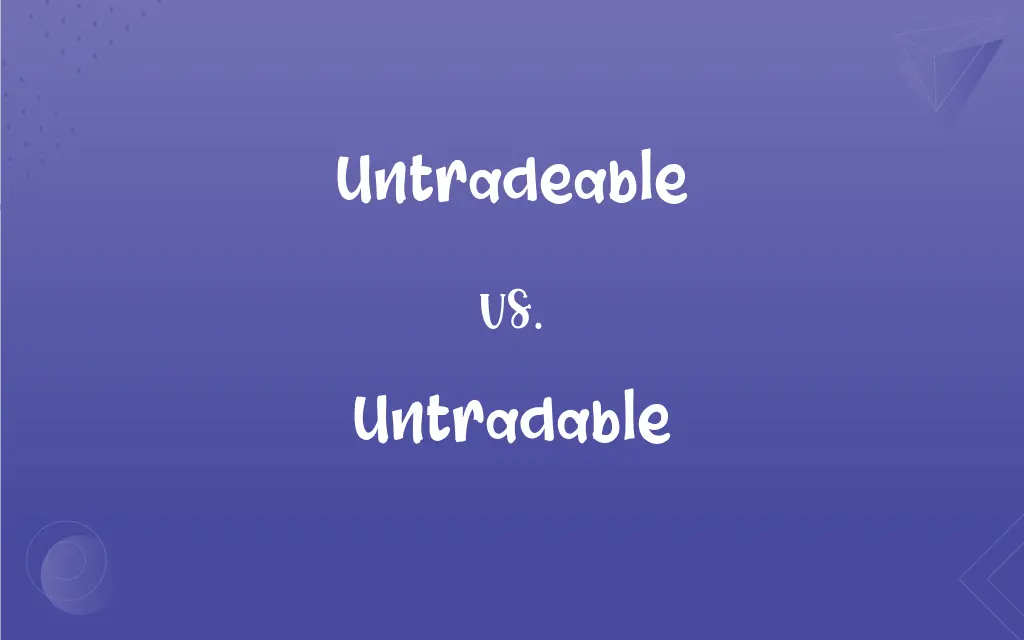Untradeable vs. Untradable: What's the Difference?
By Harlon Moss & Aimie Carlson || Updated on May 23, 2024
Untradeable and untradable both mean not capable of being traded, with "untradable" being the preferred spelling in American English, while "untradeable" is less common but still correct.

Key Differences
Untradeable refers to something that cannot be traded, often used in contexts like finance or sports. It is a less common spelling in American English but still correct. Untradable carries the same meaning, indicating something not eligible or possible to trade, and is the preferred spelling in American English.
Untradeable is used interchangeably with untradable, though its usage is less frequent. For example, in financial markets, a security might be labeled untradeable due to restrictions. Untradable, on the other hand, is more commonly used in everyday language and official documents to describe assets or items that cannot be exchanged or sold.
Both terms are adjectives describing the same condition of being non-tradeable. The choice between them often depends on regional spelling preferences or specific style guides, with untradable being more commonly accepted in American English publications.
Despite the slight variation in spelling, untradeable and untradable are understood to mean the same thing, and their usage is interchangeable. The preference for untradable in American English simplifies standardization in writing, while untradeable may appear in certain texts without altering the meaning.
In technical and professional contexts, especially in written form, untradable is generally preferred for consistency and adherence to American English norms. However, recognizing both forms is important for understanding and clarity in communication.
ADVERTISEMENT
Comparison Chart
Common Usage
Less common
More common
Preferred in American English
Less preferred
More preferred
Meaning
Not capable of being traded
Not capable of being traded
Contexts
Finance, sports
Finance, sports, general use
Standardization
Less standardized
More standardized
ADVERTISEMENT
Untradeable and Untradable Definitions
Untradeable
Prohibited from being exchanged.
Certain assets are untradeable under current laws.
Untradable
Not capable of being traded.
The company declared the bonds untradable due to low demand.
Untradeable
Not suitable for trading.
The player's contract was untradeable due to high salary.
Untradable
Restricted from trading.
Untradable securities were marked in the portfolio.
Untradeable
Restricted from trading.
Untradeable shares cannot be sold on the open market.
Untradable
Unable to participate in trade.
The untradable assets posed a challenge for investors.
Untradeable
Not capable of being traded.
The stock was deemed untradeable due to regulatory issues.
Untradable
Prohibited from being exchanged.
Some rare artifacts are untradable by law.
Untradeable
Unable to participate in trade.
The item is untradeable according to company policy.
Untradable
Not suitable for trading.
The software license is untradable and tied to one user.
Untradeable
Not able to be traded.
Untradable
Impossible to trade.
FAQs
What is the difference between untradeable and untradable?
They mean the same thing, but "untradable" is the preferred spelling in American English.
Why is untradable preferred in American English?
It follows the convention of simpler spelling in American English.
Which term is more commonly used in everyday language?
Untradable is more commonly used in everyday language.
Is untradeable more common in any specific regions?
It might appear more in British English, though both forms are understood.
Are there specific contexts where untradeable is used more?
Untradeable might be seen more in financial or legal documents, but this is rare.
Does the usage of these terms depend on industry?
Not significantly, as they are interchangeable across industries.
Do untradeable and untradable apply to digital assets?
Yes, they apply to any assets, including digital ones.
Can I use these terms in formal writing?
Yes, both are suitable for formal writing, with "untradable" being preferred.
Are both terms recognized in dictionaries?
Yes, both terms are recognized in major dictionaries.
Is one spelling more correct than the other?
Both are correct, but "untradable" is more commonly accepted in American English.
Can untradeable and untradable be used interchangeably?
Yes, they are interchangeable in meaning.
Does untradable have a different connotation than untradeable?
No, they have the same connotation and meaning.
Is untradeable used in sports contexts?
Yes, it can describe players or contracts that cannot be traded.
Is one term older than the other?
Both have been in use for a long time, with no significant age difference.
Do these terms appear in stock market contexts?
Yes, they are commonly used to describe securities that cannot be traded.
Can I use these terms in business reports?
Yes, both are appropriate for business reports, with a preference for "untradable" in American English.
Are there synonyms for untradeable and untradable?
Yes, "non-tradeable" and "non-exchangeable" are synonyms.
Do these terms apply to physical goods?
Yes, they apply to both physical and intangible goods.
How should I choose which term to use?
Use "untradable" for American English consistency, unless specified otherwise.
Are these terms applicable in legal contexts?
Yes, both terms can be used in legal contexts with the same meaning.
About Author
Written by
Harlon MossHarlon is a seasoned quality moderator and accomplished content writer for Difference Wiki. An alumnus of the prestigious University of California, he earned his degree in Computer Science. Leveraging his academic background, Harlon brings a meticulous and informed perspective to his work, ensuring content accuracy and excellence.
Co-written by
Aimie CarlsonAimie Carlson, holding a master's degree in English literature, is a fervent English language enthusiast. She lends her writing talents to Difference Wiki, a prominent website that specializes in comparisons, offering readers insightful analyses that both captivate and inform.































































